 Vampire Weekend's Surprising Jewish Stories
Vampire Weekend's Surprising Jewish Stories
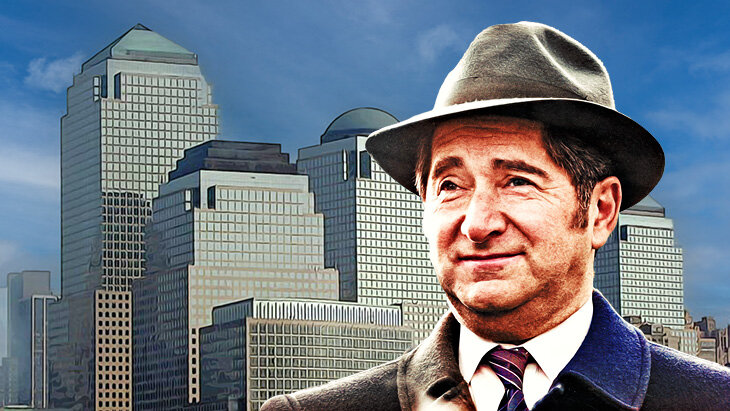

9 min read
The wealthy Jewish property developer exemplified a life of giving.
Albert Reichmann, the famous philanthropist and property developer who’s passed away at the age of 93, helped build some of the world’s most iconic buildings, including the World Financial Center in Manhattan, Canary Wharf in London and First Canadian Place in Toronto.
For a time, he and his brothers – who together built the iconic business Olympia & York Developments – ranked amongst the world’s largest landowners. Yet, to Albert, his astronomical business success was always secondary to being a mensch. His Jewish beliefs defined everything in Albert’s life and gave him a strong sense of purpose.
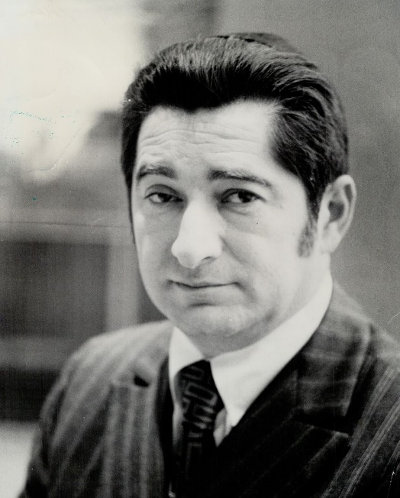 Albert Reichmann
Albert Reichmann
“His faith was everything to him. He wasn't a businessman who was a Jew. He was a Jew who was a businessman,” his son in law, Stephen Gross, described.
Albert and his family narrowly escaped the Holocaust. Born in 1929 in Vienna, Albert was one of six children in an intensely devout Jewish family. When Germany looked poised to take over Austria in 1938, Albert’s parents Samuel and Renee realized they had to leave immediately. Albert later recalled the day he saw Nazis marching in Vienna: “I remember looking out the window of our apartment and seeing the Germans come. It was on Shabbos. I was nine years old – too young to really understand the danger.” The next day, the family fled to Paris.
Their relative safety there was short lived. Two years later, just before Nazi troops invaded the city, the family fled again, bribing a truck driver with gold coins to take them out of the city. They moved to Morocco, where the family did all they could to help their fellow Jews.
There, Albert's parents built up a currency trading business. They used the financial security they were able to accrue to help others. Some of Albert’s earliest memories were of packing thousands of boxes along with his mother and siblings to send to prisoners in Nazi concentration camps back in Europe. (Albert’s mother Renee has been commemorated with plaques in both the Moroccan city of Tangier and the Czech town of Terezin, which was home to the fearsome concentration camp Theresienstadt.)
Albert lived modestly, eschewing flashy displays of wealth and making charity and giving to others a central pillar of his life.
Many of Albert’s friends, relations and business partners long noted that he always lived well below his means, a habit that he formed during his wartime years in Morocco as a child. Even when he became one of the world’s wealthiest men, Albert lived modestly, eschewing flashy displays of wealth and making charity and giving to others a central pillar of his life.
After the end of the Second World War, Albert’s siblings received visas to settle in Canada and moved to Toronto. Albert remained behind in Morocco. A trip to Israel in 1954 changed his life. In Tel Aviv, Albert met a young woman named Egosah whose world view seemed similar to his own. While she was far from wealthy, Egosah viewed herself as exceedingly fortunate and focused on giving to others.
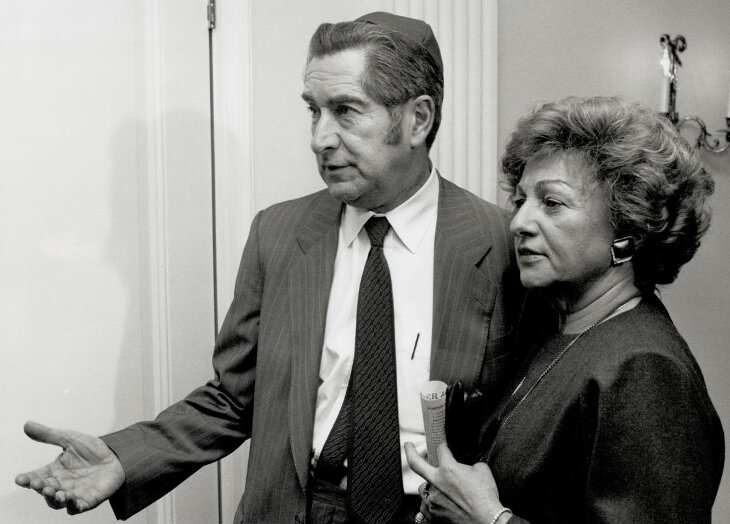 Albert and Egosah Reichmann
Albert and Egosah Reichmann
Born in 1932 in the town of Satmar in Romania, Egosah was the youngest of 11 children in a pious Jewish home. She and her family moved to the Land of Israel in the late 1930s, settling in Tel Aviv where she saw incredible poverty. Egosah later told her children that she always considered herself rich, as her parents were able to send her to school with a sandwich for lunch every day, something many of her friends’ families were unable to do. Egosah would often give her lunch away to friends whose families couldn’t afford the basic necessities at home.
In the evenings, Egosah’s family invited poor neighbors for dinner each night, helping to feed many of their neighbors and teaching their children the importance of always reaching out to help.
Albert and Egosah married and returned to Tangier, Morocco, to run the currency business that Albert’s family had established there.
In Tangier, Albert and Egosah had their first son, given the Jewish name Ephraim, and worked to strengthen the Jewish community in the city. They helped found a Jewish elementary school in Tangier, and Egosah worked as a teacher.
They moved to Toronto in 1959, joining Albert’s siblings there. Albert set up an industrial property company named York Factory Developments. In 1964 it merged with a company his brothers had founded, Olympia Floor and Wall Tile. The new firm was named Olympia & York and soon became a juggernaut in Canada’s property development sector.
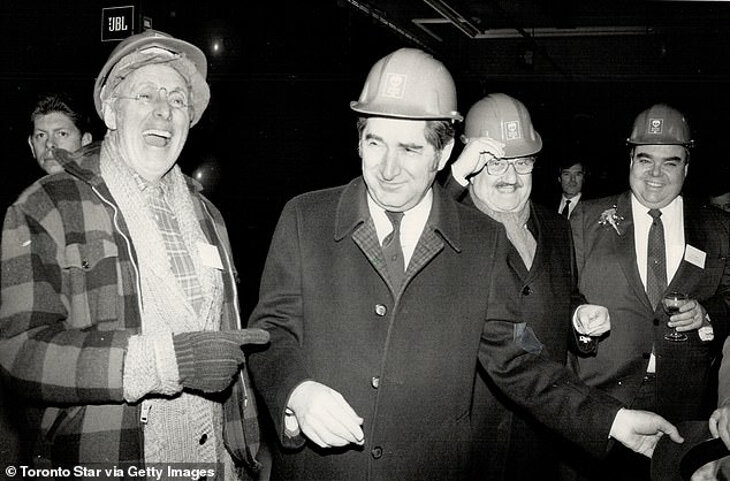
Even more than building Olympia & York, Albert and Egosah were occupied with building Jewish life in their new home of Toronto. They had three more children in Canada, and did all they could to build a strong Jewish home in their new city. Shabbat and Jewish holidays were joyous occasions. They opened their house to guests, and endowed many of the new institutions in Toronto’s growing Jewish community.
In the 1970s, Olympia & York grew into one of the world’s largest property firms, known for its integrity and high business standards. Albert’s brother Paul was the primary leader; Albert worked behind the scenes as Paul’s trusted advisor. In 1988, Albert described their working relationship: “We don’t have the personality problems, the competitiveness, the jealousies, that some people do. With bankers and investment dealers, Paul is more active. With administration and construction, I’m more active. It always works out.”
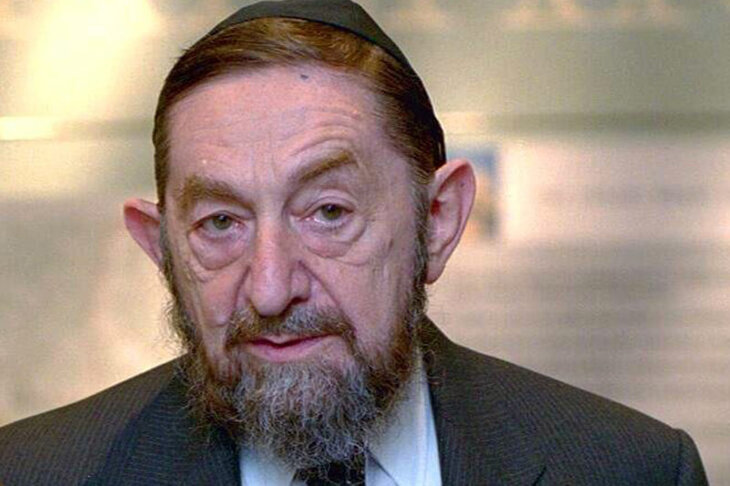 Paul Reichmann
Paul Reichmann
For a time, Olympia & York was wildly successful at buying undervalued properties, building a portfolio that included 24 million square feet at its peak in the 1980s and was valued at $3 billion. At the time, Olympia & York was the largest landlord in New York City. In the late 1980s, the firm embarked on developing Canary Wharf to the east of London, at the time the largest new office development in the world. When property prices crashed soon after, the company was overextended. They filed for bankruptcy in 1992. Brookfield Properties Corporation of Toronto purchased 47% of the firm, which was renamed World Financial Properties.
In the 1970s and 1980s, when his business success was at its height, one of Albert’s greatest passions was helping Jews trapped in the Soviet Union. Albert had already created high level political connections through his business; he’d even been instrumental in bringing Soviet leader Mikhail Gorbachev to Canada in 1983 for a political summit. Albert later described meeting Gorbachev for the first time:
Soviet leader Mikhail Gorbachev was coming to Canada, so people asked me to talk to Canadian Prime Minister Brian Mulroney and ask him to give Mr. Gorbachev a letter about the Refuseniks…when he came, Mr. Gorbachev asked Mr. Mulroney, “Who is your friend who asked you to give me this letter?” He told him. Mr. Gorbachev said, “Why don’t you ask Mr. Reichmann to talk to me personally?” The next day, I spoke to the prime minister, who told me what he had said. I said, “Okay, I’ll go to Moscow….”
(Gorbachev) was very friendly to me. I told him what I wanted. He started to make excuses and to say that it’s nothing against the Jews; they just didn’t want smart and experienced people to leave the country. I said, “That sounds like a good reason, but then why does a Jew lose his job as soon as he applies to leave? How is it helping you to keep them here if these smart people are not allowed to work?”
I went several more times to Moscow to meet him. Whenever I went, it was covered by Russian television and radio. At that time, it was a priority for Gorbachev to open up the Soviet Union economically and to do business with the West. That’s why he ordered news coverage of a Western businessman coming to Russia; he was trying to show that this was happening. I understood what he was trying to do to modernize his country and I believed that he was sincere in his efforts. I was receptive to the idea of working with him – not because it was a big priority for me to do business in Russia but because I knew it would give me opportunities to help the Yidden (Jews) there if Gorbachev valued my presence.
Whenever he visited the Soviet Union, Albert made a point of appearing in public wearing a kippah, helping to encourage Soviet Jews who were barred from making such a public gesture of their Jewish identity. It was crucial to Albert that Soviet Jews see an example of a proud Orthodox Jew, living according to timeless Jewish values, on Soviet soil, something that was impossible for Soviet Jews to do.
Two of the most famous Soviet Jews Albert managed to rescue were Vladimir Raiz and his eight-year-old son Shaul. In 1977, Vladimir applied for permission to emigrate from Moscow to Israel and was refused, becoming one of countless “refuseniks” who lost their jobs, friends and social standing while they waited in vain for years and decades for permission to leave the Soviet Union. Albert lobbied for Vladimir’s and Shaul’s release. Finally, his ceaseless entreaties of Soviet Authorities paid off: in 1990, Albert chartered a plane to Moscow to pick up Vladimir and Shaul and bring them to Israel.
Albert’s son-in-law Stephen Gross later recalled that Albert was willing to become the center of attention when he needed to. In Moscow, Albert got off the plane and was photographed meeting with officials. Later on, when the plane landed in Israel, Albert stayed on board while Vladimir and Shaul got off, refusing to take any of the attention away from the refuseniks he’d aided.
Appealing to Gorbachev directly, Albert received permission to finance a Jewish school in Russia. After the fall of the Soviet Union, Albert eventually funded scores of Jewish schools in Russia, eastern Europe and around the world.
When he was asked what life advice he’d like to give to others, Albert replied, “The general idea is: work hard and be ehrlich”, using the Yiddish word that means honest and honorable, denoting a level of kindness and refinement. An ehrlich person is one who is genuinely concerned with his or her fellow human beings, and who wishes them well.
“Work hard and be ehrlich” is also a fitting description of Albert Reichmann. I can think of no better tribute than to emulate the traits he exemplified: to look at the world with an attitude of giving, and to do so with modesty and love.
